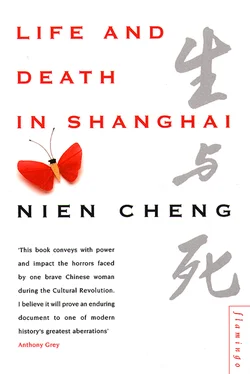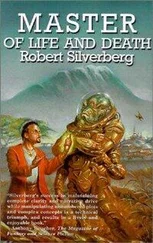Nien Cheng - Life and Death in Shanghai
Здесь есть возможность читать онлайн «Nien Cheng - Life and Death in Shanghai» — ознакомительный отрывок электронной книги совершенно бесплатно, а после прочтения отрывка купить полную версию. В некоторых случаях можно слушать аудио, скачать через торрент в формате fb2 и присутствует краткое содержание. Жанр: unrecognised, на английском языке. Описание произведения, (предисловие) а так же отзывы посетителей доступны на портале библиотеки ЛибКат.
- Название:Life and Death in Shanghai
- Автор:
- Жанр:
- Год:неизвестен
- ISBN:нет данных
- Рейтинг книги:4 / 5. Голосов: 1
-
Избранное:Добавить в избранное
- Отзывы:
-
Ваша оценка:
- 80
- 1
- 2
- 3
- 4
- 5
Life and Death in Shanghai: краткое содержание, описание и аннотация
Предлагаем к чтению аннотацию, описание, краткое содержание или предисловие (зависит от того, что написал сам автор книги «Life and Death in Shanghai»). Если вы не нашли необходимую информацию о книге — напишите в комментариях, мы постараемся отыскать её.
Life and Death in Shanghai — читать онлайн ознакомительный отрывок
Ниже представлен текст книги, разбитый по страницам. Система сохранения места последней прочитанной страницы, позволяет с удобством читать онлайн бесплатно книгу «Life and Death in Shanghai», без необходимости каждый раз заново искать на чём Вы остановились. Поставьте закладку, и сможете в любой момент перейти на страницу, на которой закончили чтение.
Интервал:
Закладка:
When Tao had finished, the speaker told the audience that he was to be watched to see if his words were spoken in true sincerity. He added that his was only the first meeting of its kind to be held. There were many others like Tao to be dealt with and Tao himself might speak again. Here he paused momentarily and swept the audience with his eyes. Did I merely imagine that his gaze seemed to linger for a fraction of a moment longer in my direction? He concluded that it was the duty of the proletariat to cleanse socialist China of all residue of imperialist influence and punish the enemies of the people. Again I thought he directed his gaze in my direction.
I certainly did not think I was important enough for this whole show to have been put on solely for my benefit. But if it was, it failed to frighten me. The emotion my first experience of a ‘struggle meeting’ generated in me was one of disgust and shame that such an act of barbarism against a fellow human being could have taken place in my beloved native land, with a history of five thousand years of civilization. As a Chinese, I felt degraded.
There was more shouting of slogans, but everybody was already on his feet moving towards the door.
The same man who tried to keep me from going home for lunch was waiting in the passage. He said to me, ‘Will you come this way for a moment? Some comrades would like to have a word with you.’
I followed him to one of the classrooms where the students’ seats and tables were piled up in one corner. The man in charge of the meeting and another one who had been on the platform were seated by the teacher’s desk. There was a vacant chair. They motioned me to sit in it.
‘Did you hear everything at the meeting?’ the man in charge of the meeting asked me.
I nodded.
‘What did you think of the meeting? I believe this is the first time you have attended one of this kind.’
Obviously I couldn’t say what I really thought of the meeting, nor did I want to lie and flatter him. So I asked, ‘May I ask you some questions that have been in my mind the whole day ?’
He looked annoyed, but said, ‘Go ahead.’
‘What organization do you represent? What authority do you have to call a meeting like this? Besides the ex-staff of Shell, who were the others present?’
Clearly he resented my questioning his authority. Making a visible effort to control himself, he said, ‘We represent the proletarian class. The meeting was authorized by the Committee in charge of the conduct of the Proletarian Cultural Revolution in Shanghai.’
I asked him to explain the purpose of the Proletarian Cultural Revolution. He said that it was a revolution to cleanse Chinese society of factors that hindered the growth of socialism. He repeated an often-quoted line of Mao Tze-tung, ‘If poisonous weeds are not removed, scented flowers cannot grow.’ He told me that everybody in China without exception had to take part in the Great Proletarian Cultural Revolution.
‘You must assume a more sincere attitude and make a determined effort to emulate Tao Fung and do your best to reform,’ he said.
‘I’m not aware of any wrong-doing on my part,’ I said, my voice registering surprise.
‘Perhaps you’ll change your attitude when you have had time to think things over,’ said the second man. ‘If you try to cover up for the imperialists, the consequences will be serious.’
‘What is there to cover up? Every act of the imperialists is clearly recorded in our history books,’ I answered.
The man raised his voice, ‘What are you talking about? We are not concerned with what happened in the past. We are talking about now, about the firm you worked for. Tao had already confessed everything. We know the Shell office in Shanghai “hung up a sheep’s head to sell dog’s meat” [a Chinese expression to mean the outward appearance of something was not the same as the reality]. We are also clear in our mind about the important role you played in their dirty game. You must not take us for fools.’
‘I’m completely at a loss to know what you refer to,’ I said. ‘As far as I know, the company I worked for never did anything either illegal or immoral. The People’s Government has an excellent police force. Surely if anything had been wrong it would have been discovered long ago.’
Both men glared at me. Almost simultaneously they shouted, ‘You are trying to cover up for the imperialists!’
I said indignantly, ‘You misunderstand me. I’m merely stating the facts as I know them. Why should I cover up for anybody? Shell’s Shanghai office is closed and the British general manager has left. No one needs my protection.’
‘Yes, yes, the British general manager has gone but you are still here. You know just as much as he did. Your husband held the post of general manager for many years. After he died you joined the firm. You certainly know everything about it.’
‘It’s precisely because I know everything about the Shanghai office of Shell that I know it never did anything wrong,’ I said.
The other man intervened. ‘I suggest you go home now and think things over. We’ll call you when we want to speak to you again. What’s your telephone number?’
I gave them my telephone number and left the room.
Outside, it was already dusk. There was a pleasant breeze. I decided to walk home on the tree-lined pavement by a roundabout route to get some exercise and to think things over.
When I passed the No. 1 Medical College, I saw my friend Winnie emerging from the half-closed gate, followed by a number of her colleagues. We waved to each other and she joined me to walk home, as she lived in the vicinity of my house.
‘Why are you out walking at this time of the evening?’ Winnie asked me.
‘I’ve just attended a struggle meeting. I’ve been told to take part in the Proletarian Cultural Revolution.’
‘Is that because Shell has closed its Shanghai office? Tell me about it.’
‘I will. Can you join me for dinner?’ I asked her. It would be good to hear what Winnie had to say about my experience. She had been through quite a number of political movements and was more experienced than I was in dealing with the situation, I thought.
‘All right. I’ll phone home from your house. Henry comes home very late these days. He has to pay a price for being a professor whenever there is a political campaign. Professors always seem to become the targets,’ Winnie said. Henry was her husband who taught architecture at Tung Chi University.
‘Is Henry in trouble?’ I inquired anxiously.
‘No, not so far, thank God,’ Winnie replied, while taking a comb out of her bag to smooth her hair. ‘Your servants will have a fit if they see me coming to dinner looking so dishevelled.’
Though she was over forty-five and had three sons, Winnie had kept her slim figure and managed to look attractive in the ill-fitting Mao jacket and baggy trousers she was obliged to wear as a teacher of English and Latin at the Medical College. After getting a degree in English literature at a New England women’s college, she and her husband, a graduate of Britain’s Cambridge University, returned to China at the end of the Sino-Japanese War. Henry was appointed professor of architecture at Tung Chi University and soon became Dean of the department. But in those days of galloping inflation, the salary of a professor could not keep pace with rising prices. To supplement the family income, Winnie used to give Chinese lessons to Europeans living in Shanghai. Disillusioned by the inability of the Kuomintang Government to cope with pressing post-war economic problems and institute reform, they welcomed the Communist takeover in 1949 as an opportunity for peace and stability.
In those days, because of the Kuomintang blackout of all news about the Communist area, very few Chinese living in Shanghai had any real understanding of Marxism, the Chinese Communist Party or Mao Tze-tung. Almost no one knew about the persecution of intellectuals carried out in Yenan in 1942 or the periodical witch-hunts for ‘spies of the Kuomintang and the imperialists’ in the Communist Party and Army. The only source of information for Chinese intellectuals about the Chinese Communist Party before 1949 had been the glowing accounts written by some western journalists and writers who made fleeting visits to the Communist-held area of China. Most of these men were liberal idealists. They were impressed by the austerity, discipline and singleness of purpose of the Communist leaders but they did not have a deep understanding of either the character of these men or the philosophy that motivated them. When the Communist Party intensified its propaganda effort, through its underground in Kuomintang-governed cities, prior to the final military push to take over the country, its promises of peaceful national reconstruction, of a united front including all sections of the Chinese society and of a democratic form of government sounded an attractive alternative to the corrupt and ineffectual rule of the Kuomintang. And the Chinese intellectuals accepted the propaganda effort as a sincere and honest declaration of policy by the Chinese Communist Party.
Читать дальшеИнтервал:
Закладка:
Похожие книги на «Life and Death in Shanghai»
Представляем Вашему вниманию похожие книги на «Life and Death in Shanghai» списком для выбора. Мы отобрали схожую по названию и смыслу литературу в надежде предоставить читателям больше вариантов отыскать новые, интересные, ещё непрочитанные произведения.
Обсуждение, отзывы о книге «Life and Death in Shanghai» и просто собственные мнения читателей. Оставьте ваши комментарии, напишите, что Вы думаете о произведении, его смысле или главных героях. Укажите что конкретно понравилось, а что нет, и почему Вы так считаете.












